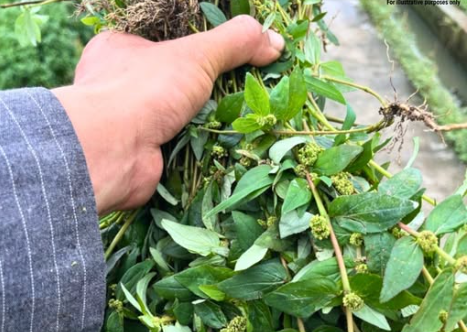Euphorbia Hirta (Asthma-Plant): Ancient Remedies and Modern Applications for Health and Wellness
Euphorbia hirta, commonly known as the “Asthma-plant,” is a medicinal herb renowned in traditional medicine for its diverse health benefits, particularly in managing respiratory ailments like asthma. This small, green, bushy plant, typically found in tropical regions, is often dismissed as a weed. However, its extensive use in ethnobotanical practices across Asia, Africa, and Latin America underscores its therapeutic potential. This article delves into the traditional uses, applications, and benefits of Euphorbia hirta, highlighting how it has served as a natural remedy for generations.

Overview and Botanical Characteristics of Euphorbia Hirta
Euphorbia hirta belongs to the Euphorbiaceae family and thrives in warm, tropical climates. It is a short, perennial plant that grows close to the ground and is easily recognizable by its hairy stems, oval leaves with a reddish tinge, and tiny, clustered flowers. While it is native to tropical and subtropical regions, Euphorbia hirta can be found worldwide, often along roadsides, gardens, and other disturbed soils.
The plant’s medicinal use dates back centuries, with historical records from different continents documenting its therapeutic roles. Known for its anti-inflammatory, antispasmodic, and bronchodilator effects, Euphorbia hirta is especially notable for its role in treating respiratory conditions such as asthma, bronchitis, and other lung-related ailments.

Traditional Uses of Euphorbia Hirta
1. Asthma and Respiratory Disorders
One of the most notable traditional uses of Euphorbia hirta is in treating asthma, hence its common name, “Asthma-plant.” Herbalists have used the plant’s leaves and stems to create remedies for respiratory issues, as it is known to help alleviate symptoms like wheezing, coughing, and difficulty breathing. The plant contains compounds with bronchodilator properties, which help relax the bronchial tubes and facilitate easier airflow to the lungs. The anti-inflammatory effects of Euphorbia hirta further aid in reducing airway inflammation and congestion, making it valuable in traditional treatments for asthma and other breathing problems.

2. Antibacterial and Antiviral Properties
Euphorbia hirta has long been valued in traditional medicine for its antibacterial and antiviral capabilities. Its extracts have been used to combat infections and support immunity. It is particularly used in rural communities to treat respiratory infections, skin infections, and even minor wounds. The plant’s antimicrobial activity has been confirmed by several studies, with findings showing that Euphorbia hirta’s extracts can inhibit the growth of various bacterial strains, providing a natural alternative for infection management.

3. Diarrhea and Digestive Health
In traditional medicine, Euphorbia hirta is commonly used to treat digestive issues, including diarrhea and dysentery. The plant’s antispasmodic and anti-inflammatory properties help reduce gut inflammation and spasms, providing relief from discomfort and cramping associated with diarrhea. In some regions, Euphorbia hirta tea is consumed as a remedy for stomach pain, and it is also used as a natural purgative to cleanse the digestive tract.
4. Pain Relief and Anti-Inflammatory Uses
Traditional healers have utilized Euphorbia hirta for its analgesic and anti-inflammatory properties, using it to relieve pain and inflammation associated with various conditions. The plant is applied as a poultice or used as a decoction for pain relief from conditions such as arthritis, joint pain, and headaches. Its anti-inflammatory effects have also been useful in managing swelling and redness in skin conditions, providing a natural remedy for minor injuries and ailments.

5. Menstrual Health
Euphorbia hirta is also recognized in traditional medicine for its benefits in women’s health, especially in regulating menstrual cycles and easing menstrual discomfort. The plant’s antispasmodic properties help alleviate cramps, while its mild estrogenic effect can be beneficial in balancing hormones. In some cultures, a tea made from Euphorbia hirta is taken to manage menstrual pain, heavy bleeding, and even symptoms of menopause.
6. Urinary Tract Health
For centuries, Euphorbia hirta has been used to address urinary tract infections and other urinary health issues. Its diuretic properties help flush out toxins and prevent the buildup of bacteria in the urinary tract. Traditional healers prepare infusions of Euphorbia hirta to help relieve symptoms of UTIs, supporting overall urinary health.

Active Compounds and Pharmacological Properties
Euphorbia hirta’s medicinal properties stem from its diverse range of bioactive compounds, including alkaloids, flavonoids, phenols, and tannins. These compounds collectively contribute to the plant’s pharmacological effects, such as:
- Antioxidant: The presence of flavonoids and phenols contributes to Euphorbia hirta’s antioxidant capacity, which helps neutralize free radicals in the body and reduce oxidative stress.
- Anti-inflammatory: The plant’s anti-inflammatory effect is mainly attributed to its tannins, which help reduce inflammation and swelling in the body, beneficial for both internal and topical applications.
- Bronchodilator: Euphorbia hirta’s alkaloid content provides bronchodilator effects, which aid in relaxing the bronchial tubes, making it easier for individuals to breathe, especially during asthma attacks.
Common Preparations and Applications of Euphorbia Hirta
1. Infusions and Teas
One of the most common ways to consume Euphorbia hirta is by making an infusion or tea. Dried or fresh parts of the plant (leaves and stems) are boiled in water and then strained. This tea is traditionally consumed to relieve symptoms of asthma, cough, digestive issues, and menstrual pain. It is recommended to consume the tea in moderate amounts due to the plant’s potent effects.

2. Poultices and Topical Applications
Euphorbia hirta can also be applied externally as a poultice for pain relief and to treat skin infections. Fresh leaves are crushed or ground to form a paste and applied to the affected area. This topical application is particularly effective for wounds, minor skin infections, and swelling due to its antibacterial and anti-inflammatory properties.
3. Extracts and Tinctures
In traditional herbalism, Euphorbia hirta is also prepared as an extract or tincture. These concentrated forms capture the plant’s active compounds and are used in small doses for various health conditions, including respiratory ailments, digestive issues, and immune support.

4. Capsules and Powders
For those who prefer a more standardized form, Euphorbia hirta is also available in capsule or powdered form in some herbal supplement markets. These preparations make it easier to manage dosage and offer a convenient way to experience the plant’s benefits without the need for fresh or dried herbs.
Safety Considerations and Precautions
While Euphorbia hirta is generally safe when used in traditional, moderate amounts, it should be consumed with caution due to its potency. Here are a few considerations:
- Pregnancy and Breastfeeding: The use of Euphorbia hirta is not recommended for pregnant or breastfeeding women, as its effects on pregnancy have not been thoroughly studied.
- Allergic Reactions: Some individuals may experience skin irritation or allergic reactions when handling or consuming Euphorbia hirta. It is advisable to perform a patch test before topical use.
- Dosage: Overconsumption may lead to adverse effects, especially for individuals sensitive to plants in the Euphorbiaceae family. It is best to consult a qualified herbalist or healthcare professional before incorporating Euphorbia hirta into your health routine.

Conclusion
Euphorbia hirta, or the “Asthma-plant,” holds an esteemed place in traditional medicine, offering a range of health benefits for respiratory health, digestive wellness, pain relief, and more. Its various applications, from infusions to topical poultices, demonstrate the plant’s versatility and effectiveness. However, like many medicinal herbs, Euphorbia hirta should be used with respect and caution. As interest in herbal medicine grows, Euphorbia hirta’s potential as a natural remedy continues to capture the attention of both traditional practitioners and modern researchers, bridging ancient wisdom with contemporary wellness.






